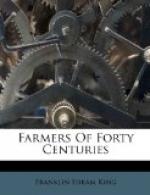It was 6:30 P. M. before our train pulled into the station at Tsinan; 7:30 when we had finished supper and engaged a ricksha to take us to the American Presbyterian College in quest of an interpreter. We could not speak Chinese, the ricksha boy could neither speak nor understand a word of English, but the hotel proprietor had instructed him where to go. We plunged into the narrow streets of a great Chinese city, the boy running wherever he could, walking where he must on account of the density of the crowds or the roughness of the stone paving. We had turned many corners, crossed bridges and passed through tunneled archways in sections of the massive city walls, until it was getting dusk and the ricksha man purchased and lighted a lantern. We were to reach the college in thirty minutes but had been out a full hour. A little later the boy drew up to and held conference with a policeman. The curious of the street gathered about and it dawned upon us that we were lost in the night in the narrow streets of a Chinese city of a hundred thousand people. To go further would be useless for the gates of the mission compound would be locked. We could only indicate by motions our desire to return, but these were not understood. On the train a thoughtful, kindly old German had recognized a stranger in a foreign land and volunteered useful information, cutting from his daily paper an advertisement describing a good hotel. This gave the name of the hotel in German, English and in Chinese characters. We handed this to the policeman, pointing to the name of the hotel, indicating by motions the desire to return, but apparently he was unable to read in either language and seemed to think we were assuming to direct the way to the college. A man and boy in the crowd apparently volunteered to act as escort for us. The throng parted and we left them, turned more corners into more unlighted narrow alleyways, one of which was too difficult to permit us to ride. The escorts, if such they were, finally left us, but the dark alley led on until it terminated at the blank face, probably of some other portion of the massive city wall we had thrice threaded through lighted tunnels. Here the ricksha boy stopped and turned about but the light from his lantern was too feeble to permit reading the workings of his mind through his face, and our tongues were both utterly useless in this emergency, so we motioned for him to turn back and by some route we reached the hotel at 11 P. M.
We abandoned the effort to visit the college, for the purpose of securing an interpreter, and took the early train back to Tsingtao, reaching there in time to secure the very satisfactory service of Mr. Chu Wei Yung, through the further kind offices of Mr. Scott. We had been twice over the road between the two cities, obtaining a general idea of the country and of the crops and field operations at this season. The next morning we took an early train to Tsangkau and were ready to walk through the fields and to talk with




